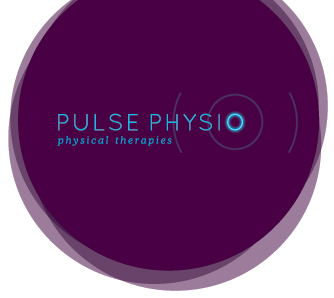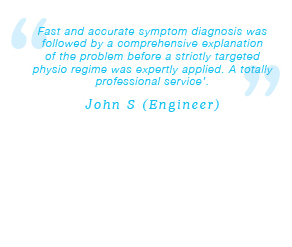 |
 |
||
 |
|
Frequently Asked Questions
1. What Do Chartered Physiotherapists Do? Chartered Physiotherapists work to combat a broad range of physical problems. In particular those associated with neuromuscular, musculoskeletal, cardiovascular and respiratory systems (Chartered Society of Physiotherapy, 2006). Here at Pulse Physio we treat spinal and peripheral joint problems, accidents and sports injuries. We can also help after spinal operations and hip, knee and other joint replacements, as well as treating patients who have had accidents. We can also work with large companies treating employees and looking at the way people work in order to prevent physical problems such as repetitive strain injury.
2. What Can I Expect At Pulse Physio? At Pulse Physio you can expect a thorough examination of your problem. This will include postural and ergonomic analysis, a thorough biomechanical analysis, assessment of muscle tone and strength, joint flexibility and movement control. Our fully qualified, highly skilled staff will be able to fully inform you of what is wrong and provide you with the information you will need to help your recovery. Treatments that we may use to help your recovery include; joint mobilisation/manipulation, therapeutic exercise and stretches, therapeutic ultrasound, electrical stimulation (TENS), postural advice and education, taping and strapping techniques, orthotics, and therapeutic massage/myofascial release.
3. What Treatments Can I Expect? Treatment is tailored specifically to every individuals needs and will therefore vary from person to person. We can provide joint mobilisation/manipulation, therapeutic exercises and stretches, therapeutic ultrasound, electrical stimulation (TENS), postural advice and education, taping and strapping techniques, orthotics, and therapeutic massage/myofascial release.
4. How Much Treatment Will I Need? This depends very much on what your injury is, how long you have had it, and of course how severe it is. On average a full course of physiotherapy is 6 sessions. There is a large emphasis on advice and education at Pulse Physio so that you can learn how to manage the condition yourself. This not only minimises your costs, but ultimately maximises how well you respond to treatment. You can minimise the number of treatments by doing a few simple things: (a) Be seen by a physiotherapist early (i.e. within 6 weeks). The longer you leave a problem the worse it tends to get and the harder it is to treat. You also risk the problem becoming chronic.
5. How Do I Make An Appointment? Appointments can be made by calling or emailing the clinic of your choice. Please visit our contact pages for information on specific contact numbers and email addresses.
|
|